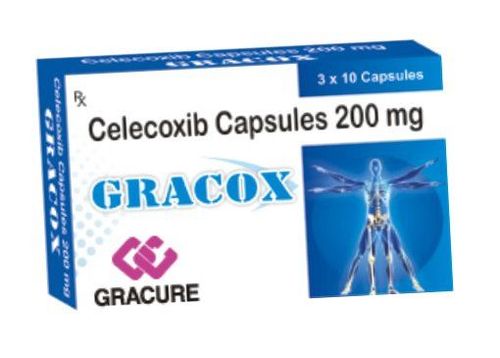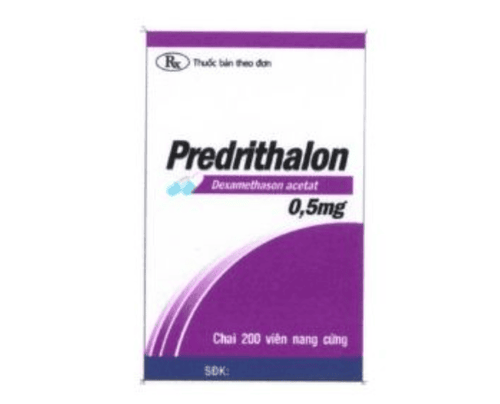This is an automatically translated article.
Diclomark is a pain reliever, anti-inflammatory indicated for the treatment of arthritis, menstrual pain, headache,... So what is the use of the drug and what are the notes when using the drug. article below.1. What is Diclomark?
Diclomark's main ingredient is Diclofenac - a non-steroidal anti-inflammatory drug (NSAID), with antipyretic, anti-inflammatory, and analgesic effects. Diclomark works through the mechanism of inhibiting the synthesis of prostaglandins - a substance that plays an important role in the inflammatory process, causing pain. The drug does not reduce the synthesis of proteoglycan - a fibrous structure located in articular cartilage that protects joint cartilage. The drug has analgesic effect in pain of moderate intensity or higher, fast relief of pain associated with inflammation due to trauma, after surgical intervention, pain due to movement,... In addition, Diclomark also relieves pain. primary dysmenorrhea, reduced bleeding, improved headache relief in headaches with no physical cause. Diclomark is rapidly absorbed from the gastrointestinal tract but is affected by food, so parenteral administration will have a higher effect. After entering the body, the drug is metabolized in the liver and bound to plasma proteins is 99.7%. , mainly with albumin (99.4%). The drug crosses the synovial membrane, placenta and breast milk, and is eliminated in urine, feces and bile.2. Indications of the drug Diclomark
Diclomark is indicated for the treatment of the following pathologiesAcute pain in the department of Otolaryngology, Odonto-Stomatology. Primary dysmenorrhea. Pain after soft tissue injury, pain caused by movement. Pain after surgery. Migraine-type headache. Inflammatory pain in osteoarthritis. Ankylosing spondylitis . Rheumatoid arthritis. Inflammatory pathology of nerve root pain with or without compression. Inflammatory disease of tendons, synovial membrane, synovial membrane. Gout. Renal colic, biliary colic.
3. Contraindications of Diclomark
Diclomark is contraindicated in the following medical conditions:Allergy to Diclofenac, Aspirin, non-steroidal anti-inflammatory drugs or any other ingredients of the drug. Patients with active gastrointestinal disease or a history of peptic ulcer perforation. Patients with asthma should not take Diclomark. Patients with moderate to severe hepatic or renal impairment. The patient is wearing contact lenses. Patients with colloidal diseases. Pregnant and lactating women should not use Diclomark. Note when using Diclomark:
Diclomark may increase the risk of gastrointestinal damage in patients with previous peptic ulcers. Check liver function and kidney function before and during treatment for patients with hepatic impairment because the drug may increase hepatotoxicity, nephrotoxicity. The drug crosses the placenta and breast milk, so if it is not really necessary, do not prescribe Diclomark for this object. Elderly people have a higher risk of perforation and ulceration of the gastrointestinal tract when taking drugs than the general population. Diclomark may increase the risk of peripheral edema in patients with heart failure and hypertension. The drug can cause bronchospasm, worsening of symptoms in asthmatic patients. The drug can cause fatigue, drowsiness, decreased concentration, so it should not be used by patients who are doing jobs that require meticulousness such as operating machinery, driving, ...
4. Diclomark drug interactions
Combining Diclomark with other NSAIDs, steroids will increase side effects on the gastrointestinal tract. Patients with hypertension should consider increasing the dose when using Diclomark combination because it may reduce the effect of blood pressure drugs. In combination with potent diuretics and immunosuppressants, nephrotoxicity is increased. Diclomark enhances the effect of anticoagulants when combined. Quinolone antibiotics increase the risk of convulsions when used with Diclomark.5. Dosage and usage
How to use: Diclomark is prepared as a solution for injection, using deep and slow intramuscular injection.Dosage
Usual dose: 1 ampoule (75mg/3ml) x 1 time/day. Intramuscular injection In case of severe pain: 1 ampoule (75mg/3ml) x 2 times/day. Intramuscular Injection The injection dose of Diclomark can be increased or decreased according to the doctor's prescription based on the patient's pain condition.
6. Diclomark drug side effects
Some unwanted effects may be encountered when using DiclomarkEpigastric pain, nausea, vomiting, diarrhea, constipation. Headache, dizziness, dizziness, possibly drowsiness. Allergic rash, pruritus, urticaria. Black stools, gastrointestinal bleeding (rare). Edema, acute renal failure, proteinuria, nephrotic syndrome. Hemolytic anemia. Hypertension, congestive heart failure. Anaphylaxis . Thus, Diclomark is an analgesic and anti-inflammatory drug that works quickly in acute pain of moderate or higher severity. The drug is in the form of an injectable solution, so it should only be used in medical facilities under the direction and supervision of a doctor.
Please dial HOTLINE for more information or register for an appointment HERE. Download MyVinmec app to make appointments faster and to manage your bookings easily.













